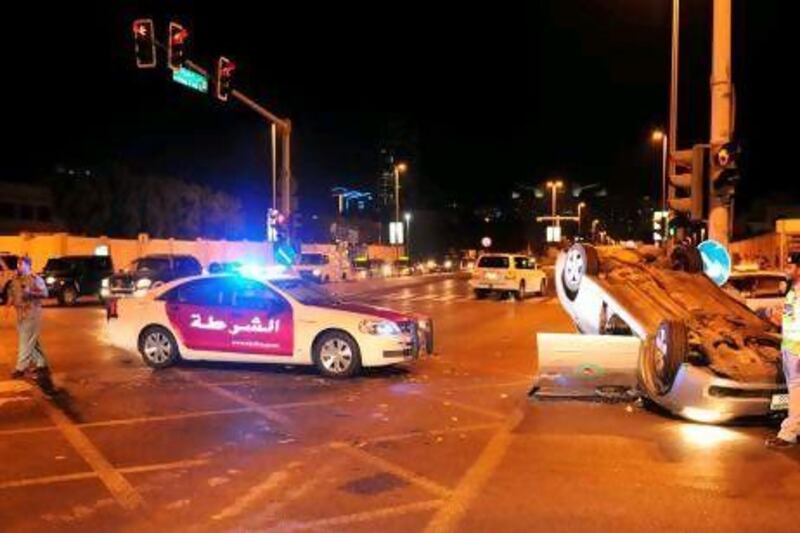ABU DHABI // Police in the emirate have issued more than five million traffic fines this year, averaging more than 15,000 a day.
An estimated 800,000 were issued on the spot by police and drivers can expect this to become an even more frequent occurrence.
More patrols will be on Abu Dhabi roads next year as part of a five-year plan to increase the number of fines handed over. Police hope this will encourage drivers to take more responsibility for their actions.
"If somebody is speeding these guys will be there," said Capt Ahmad Al Muhairi, head of traffic safety at Abu Dhabi Police.
"Before we would say, 'go' and we would give them a fine. Drivers would not feel it. Drivers are more affected when we stop them to give them the fine."
Traffic deaths have decreased to 334 from 409 in the emirate between 2009 and last year, since the introduction of a programme that includes on-the-spot penalties.
This is despite an increase in drivers and registered vehicles.
Speaking on the sidelines of the Gulf Traffic Exhibition and Conference yesterday, Capt Al Muhairi told of long-term strategies to achieve Abu Dhabi's target of no fatalities by 2030.
Speeding, jaywalking and red-light offences are the leading causes of road accidents in Abu Dhabi.
Police will work with other bodies to introduce a strategy for road safety that includes enforcement, education and safer engineering.
A total of 90 radar cameras were installed on the Abu Dhabi-Ghweifat motorway last year, the emirate's most dangerous road. The road now has 130 cameras and point-to-point radar will be introduced soon.
The Al Gharbia region will have 200 speed cameras by the end of the year while the capital will have 500 speed cameras and radar guns by the end of next year.
Although the number of speeding offences remains high, far fewer drivers exceed 200kph. Before the safety programme there was an average of 60 penalties issued a year for motorists driving over 200kph. Now there are about two a year.
Most speeders are caught travelling between 120kph and 160kph.
As part of their campaign to reduce deaths, police are considering a gradual reduction of the maximum speed limit on the Abu Dhabi-Al Ain (E22) motorway.
"We might reduce it by 5 per cent every year until we reach a reasonable speed limit," said Capt Al Muhairi. "If you have more speed you will have more fatalities."
Despite fewer crashes, the proportion of red-light offences has increased because of congestion.
"As a percentage it's increasing," said Dr Atef Garib, a traffic consultant for the police and Egypt's former deputy minister of transport. "The city's getting more mature so people are anxious to cross the red light. This is a normal phenomenon."
Police plan to introduce more red-light cameras, with 30 being installed at junctions each year over the five-year programme to run with driver-awareness campaigns.
Dr Garib said safety was the key message: "We are not after ticketing."
An electronic system will allow police to enter crash information on site to identify blackspots, engineering problems and dangerous road user behaviour.
The system, which connects crash and traffic data, car histories, and drivers' medical histories and socio-economic background, could be in place for as soon as next month.
There were 192 fatalities in Abu Dhabi in the first nine months of this year. Abu Dhabi Police only count the deaths of those who have died at the scene.
"Most of the indicators show major improvements when we compare ourselves with other countries but we are still not doing well in road safety," said Dr Garib.
"We are doing well in improving but not in performance of the whole target."






